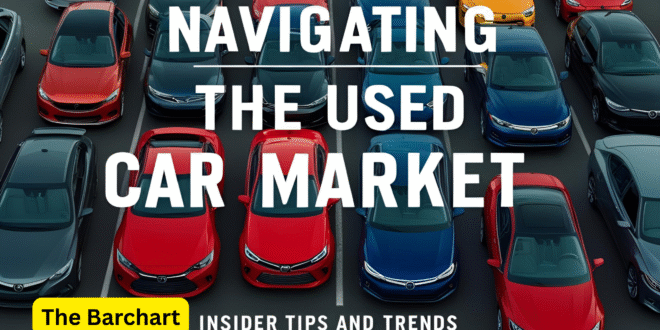Navigating the used car market can be a challenging experience for many buyers, especially first-timers.
With countless options, varying prices, and differing vehicle conditions, knowing where to start and what to watch for is essential.
The used car market offers tremendous opportunities to find reliable, affordable vehicles, but it also requires careful research and smart decision-making.
Understanding current market trends, popular car models, and economic factors can help buyers identify the best time to purchase and spot good deals.
Insider tips like checking a vehicle’s history, getting an independent inspection, and comparing prices across platforms can save buyers from costly mistakes.
Moreover, the rise of online marketplaces has transformed the used car market, making it easier to browse thousands of listings and access detailed information.
However, this convenience also requires consumers to stay vigilant against scams and misleading ads.
Smart buyers focus on negotiating effectively, understanding the difference between certified pre-owned and regular used cars, and staying informed about future trends like electric vehicles entering the market.
Overall, navigating the used car market successfully combines knowledge, patience, and strategic thinking to ensure that buyers make a purchase that meets their needs and budget.
What Is the Used Car Market and How Does It Work?
The used car market refers to the buying and selling of pre-owned vehicles.
Unlike new cars that come directly from manufacturers, used cars have had previous owners.
This market includes a variety of sellers such as private individuals, dealerships, and online platforms.
Buyers in this market benefit from more affordable prices and a wider range of options compared to new car buyers.
The market functions through supply and demand, where prices fluctuate based on vehicle age, condition, mileage, and popularity.
Many factors influence the working of this market, such as vehicle depreciation, market trends, and economic conditions.
Understanding how the used operates helps buyers make informed decisions, ensuring they get good value for money while minimizing risks associated with used vehicles.
Key Factors Driving Growth in the Used Car Market

Several key factors have contributed to the rapid growth of the used car market in recent years.
Economic uncertainties and rising new car prices have pushed many buyers toward pre-owned vehicles.
Additionally, increased vehicle durability means used cars remain reliable for longer, attracting more customers.
The growth of digital marketplaces and mobile apps has also made it easier for consumers to research, compare, and purchase used cars, boosting overall sales.
Environmental concerns and interest in electric vehicles are reshaping buyer preferences but haven’t slowed the used expansion.
The availability of certified pre-owned programs further reassures buyers, driving growth.
Overall, affordability, accessibility, and evolving consumer preferences are the main drivers behind the flourishing used worldwide.
Popular Car Models Dominating the Used Car Market.
In the used certain models consistently outperform others due to their reliability, fuel efficiency, and resale value.
Popular brands like Toyota, Honda, Ford, and Volkswagen often dominate the market because they are known for long-lasting performance and affordability.
SUVs and crossovers have also gained immense popularity, especially models like the Toyota RAV4 and Honda CR-V, which combine utility with efficiency.
Sedans like the Honda Civic and Toyota Corolla remain strong contenders for buyers seeking economical daily drivers.
These popular models attract buyers due to their proven track record and easy availability of spare parts.
Being aware of these dominant models helps consumers identify vehicles that hold value and are less likely to encounter maintenance issues, making the used car market more navigable for new buyers.
How to Find the Best Deals in the Used Car Market
Finding the best deals in the used requires patience, research, and a keen eye for value.
Start by setting a clear budget and identifying the type of car you want.
Use online platforms that aggregate listings, and compare prices from multiple sellers.
Look for certified pre-owned vehicles, as they often come with warranties and have undergone thorough inspections.
Inspect the vehicle’s history using reports to check for accidents, maintenance, or title issues.
Negotiation skills are crucial; don’t hesitate to ask for a price reduction based on the car’s condition or market value.
Timing can also affect pricing—buying during off-peak seasons may yield better deals. Lastly, consider getting a trusted mechanic’s opinion before purchasing.
With these strategies, buyers can confidently navigate the used car market and secure great bargains.
The Role of Online Platforms in Transforming the Used Car Market
Online platforms have revolutionized the used car market by making the buying and selling process more transparent and convenient.
Websites and apps like CarMax, AutoTrader, and Carvana allow buyers to browse thousands of listings with detailed photos, vehicle history, and seller ratings all from home.
These platforms reduce the need to visit multiple dealerships and help buyers easily compare prices and models.
Additionally, online platforms often offer financing options, home delivery, and return policies, enhancing buyer confidence.
For sellers, listing a vehicle online increases reach to potential buyers beyond local boundaries.
The rise of digital tools has also introduced features like virtual inspections and AI-driven price estimations, making the used car market more efficient and accessible than ever before.
Common Mistakes to Avoid When Buying from the Used Car Market
While the used car market offers great opportunities, buyers often make mistakes that can lead to costly regrets.
One common error is neglecting a thorough vehicle inspection before purchase. Skipping this step can hide mechanical issues or previous damage.
Another mistake is overlooking the importance of a detailed vehicle history report, which reveals accidents, title problems, or odometer fraud.
Many buyers also fall for overly aggressive sales tactics or rush into decisions without proper research.
Failing to negotiate effectively is another pitfall; many sellers expect buyers to negotiate price, and leaving money on the table is avoidable.
Lastly, not considering the total cost of ownership—such as insurance, maintenance, and taxes—can lead to financial surprises.
Awareness of these mistakes helps buyers make wiser choices in the used car market.
How Economic Trends Influence the Used Car Market
The used is closely tied to broader economic trends. During economic downturns or recessions, buyers often turn to used vehicles to save money, causing demand to rise.
Conversely, when the economy is strong, people may prefer new cars, slightly dampening used car sales.
Inflation and rising interest rates impact financing costs, influencing buyers’ purchasing power.
Additionally, supply chain disruptions affecting new car production can push more consumers into the used.
Government policies, such as incentives for electric vehicles or restrictions on older cars, also shape market dynamics.
Understanding these economic influences helps buyers anticipate price fluctuations and market availability, enabling smarter decisions in the used.
Certified Pre-Owned Cars vs. Regular Used Cars: What’s the Difference?
Certified Pre-Owned (CPO) cars and regular used cars differ significantly in terms of inspection, warranty, and seller reliability within the used car market.
CPO vehicles undergo rigorous inspections and repairs to meet manufacturer standards, often accompanied by extended warranties and roadside assistance.
These perks provide buyers with peace of mind about the car’s condition and reliability.
Regular used cars, sold “as-is,” do not come with these guarantees and may carry higher risks regarding hidden defects or maintenance issues.
While CPO cars tend to be priced higher, many buyers find the added security worth the cost.
Knowing these differences helps buyers decide what level of risk they are willing to accept when navigating the used car market.
Negotiation Strategies for Success in the Used Car Market
Effective negotiation is key to securing a good deal in the used car market. Start by researching the fair market value of the car model you’re interested in to set a realistic target price.
Approach the seller with confidence and be prepared to walk away if the price isn’t right.
Point out any flaws or upcoming maintenance costs as leverage for a lower price. Be polite but firm, and don’t be pressured into quick decisions.
Sometimes bundling extras, like free servicing or new tires, can add value without lowering the price.
Also, consider timing your purchase at the end of the month or year when sellers may be more willing to negotiate.
With preparation and patience, buyers can confidently negotiate better deals in the used car market.
The Future of the Used Car Market: Electric Vehicles and Digital Innovations

The used is evolving rapidly with the rise of electric vehicles (EVs) and digital innovations.
As EVs become more affordable and popular, a growing segment of the used will consist of these environmentally friendly vehicles.
Digital tools such as AI-driven pricing, virtual reality inspections, and blockchain-based ownership records are improving transparency and trust.
Online marketplaces continue to innovate, offering contactless transactions and instant financing approvals.
Additionally, subscription models and car-sharing platforms may change how consumers approach car ownership altogether.
The future used car market promises to be more tech-savvy, sustainable, and consumer-friendly, offering exciting opportunities for buyers and sellers alike.
FAQs
Q1: What is the used car market?
The used involves buying and selling pre-owned vehicles through private sellers, dealerships, and online platforms.
Q2: Why is buying from the used car market beneficial?
It offers more affordable options, a wider selection, and potentially slower depreciation compared to new cars.
Q3: What should I check before buying a used car?
Inspect the vehicle thoroughly, check the history report, and get a mechanic’s opinion.
Q4: Are certified pre-owned cars better than regular used cars?
CPO cars come with warranties and have passed inspections, offering more buyer protection.
Q5: How do economic conditions affect the used car market?
Economic downturns often increase demand for used cars, while strong economies may boost new car sales.
Q6: Can I negotiate the price in the used car market?
Yes, negotiation is common and expected; research and patience help you get better deals.
Q7: Is the used car market shifting towards electric vehicles?
Yes, the growth of EVs is changing the types of vehicles available in the used car market.




